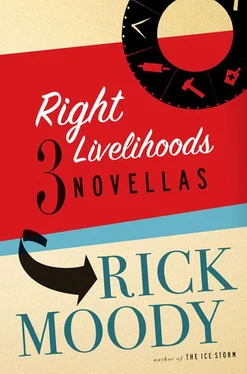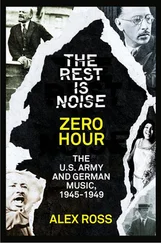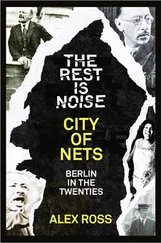tends to appear
, on a statistical basis.
Q: Given that this is a possibility, why are Albertine’s effects only visible in New York City?
A: The more provocative question would be, according to quantum indeterminacy, does New York City actually exist? At least, if you take the hypothesis of theoretical physics to its logical conclusion. This would be a brain-in-the-vat hypothesis. NYC as an illusion purveyed by a malevolent scientist. Except that the malevolent scientist here is Albertine herself. She leads us to believe in a certain New York City, a New York City with post-apocalyptic, post-traumatic dimensions and obsessions. And yet perhaps this collective hallucination is merely a way to rationalize what is taking place: that it is now almost impossible to exist in linear time at all.
Q: So maybe in Kansas City they have similar hallucinations. Kansas City is the center of some galloping drug epidemic. And the same thing in Tampa or Reno or Harrisburg?
A: Could be. Something like that.
(Pause.)
Can I borrow some of your—?
Q: There’s only a little left. But, sure, get a buzz on. (Getting serious.) Have you attempted a catalogue of types of Albertine experiences?
A: Well, sociopaths seem to have a really bad time with the drug. We know that. And it’s a startling fact, really. Since much of the distribution network is controlled by sociopaths. But at most dosage thresholds, sociopaths have stunted Albertine experiences. They’ll remember their driver ed exam for hours on end. By
sociopaths
, I’m referring especially to individuals with poor intrapsychic bonding, poor social skills. Individuals who lack for compassion. It would be hard to imagine them taking much pleasure in Albertine. On the other hand, at the top end of the spectrum are the ambiguous experiences of which you are no doubt aware. People who claim to remember future events, people who claim to remember other people’s memories, people who claim to have interacted with their memories. And so forth. At first we believed that these experiences, which characterized many of the people here conducting our studies — myself included — were only occurring, if that’s the right word, among the enlightened. That is, we believed that
ahistorical remembering
was an aspect of wish fulfillment among the healthiest and most engaged personalities. But then we learned that malice, hatred, and murderous rage could be just as effective at creating these episodes. In either case, we became convinced that the frequency of these reports merited our attention. If true, the fact of
ahistorical remembering
would have to suggest that the fabric of time is not woven together as consistently as we once thought. We tried at first to analyze whether these logically impossible experiences were “true” on a factual level, but now we are more interested in whether they are repeatable, visible to more than one person, et cetera.
Q: Does your catalogue of experiences shed any light on Albertine’s origin?
A: One compelling theory that’s making the rounds among guys in the sciences here at the college is that Albertine has infinite origins. That she appeared in the environment all at once, at different locations, synchronously, according to some kind of philosophical or metaphysical randomness generator. There’s no other perfect way to describe the effect. According to this view, the disorder she causes is so intense that her origin is concealed in an effacement of the moment of her origin, because to have a single origin violates the parameters of nonlinearity. Didn’t we already
do
this part about the origin?
Q: Shit. I guess you’re right. Okay, hang on. (Regroups.) Do you, do you think it’s possible to manipulate the origin of Albertine, to actually control the drug so as to alter a specific narrative? Like, say, the rise of the Albertine crime syndicate?
A: Sure, persons of my acquaintance have done plenty of that. At least on an experimental basis. We have had no choice. But I’m not at liberty to go into that today.
Q: Let’s go back to the issue of what to do about the epidemic. Do you have a specific policy recommendation?
A: I did have some good ideas about that.
(Ponders.)
Okay, wait just a second. I’m going to look through my papers on the subject here.
(Riffles mounds on desk.)
I’m forgetting so much these days. Okay, my observation is that Albertine finds her
allure
in the fact that the human memory is, by its nature, imperfect. Every day, in every way, we are experiencing regret over the fact that we can conjure up some minimal part of the past, but not as much as we’d like. This imperfection of memory is built into the human animal, and as long as it’s an issue, the Albertine syndicates will be able to exploit it. Strategies for containment have to come from another direction, therefore. Which is to say that the only thing that could conceivably help in the long run would be to make distribution of the drug extremely widespread. We should make sure everybody has it.
Q: How would that help?
A: Since Albertine has forgetfulness as a long-term side effect, it’s possible that we could actually make everyone
forget that Albertine exists
It would have to be concerted, you understand. But let me make an analogy. At a certain point in heroin addiction, you no longer feel the effects of the opiate, you only service the withdrawal. A similar effect could take place here. At a certain point, everyone would be trying to avoid the forgetting because they can’t work effectively, they can’t even remember where
work is,
and yet soon this forgetting would begin to invade even the drug experience, so that what you remember grows dimmer because you are beginning to accelerate plaque buildup and other anatomical effects. With enough of this forgetting, everyone would forget that they were addicts, forget that they needed the drug to remember, forget that memory was imperfect, and then we would be back to some kind of lowest common denominator of civic psychology. Damaged but equal.
Q: How would you go about doing this?
(Ernst Wentworth gives the interviewer the once-over in a way he has not done before.)
A: We’re going to put it in the water supply.
Q: Hasn’t that been tried already?
A: What do you mean?
Q: I think someone told me that an attack on the water supply was recently thwarted.
A: Are you serious?
Q: Well, unless someone was using disinformation—
Wentworth shouts:
A: Guys, you recording all of this?
The room was bugged, of course, and on this signal a bunch of academics rushed into Wentworth’s office, blindfolded me, and carried me out. I didn’t struggle. When I was freed, I was in the Brooklyn College astronomy lab. It was Ernst Wentworth who gently removed my blindfold.
“You understand we have no choice but to take every precaution. Just a couple of days ago, Claude Jannings, from the linguistics department, watched his wife disappear in front of him. She was there, in the kitchen, talking about the dearth of political writings pertaining to the Albertine epidemic, and then she was gone, just absolutely gone. As if someone were listening to the conversation the whole time. Apparently, her remarks about Albertine and inchoate plans to write on the subject were enough to make her a target.”
My eyes became accustomed to the dim light of the astronomy lab. The interior was all concrete, functional, except for the platform where you could get up and take a gander at the heavens. Around me, there was a circle of guys in tweed jackets and cardigan sweaters. I saw a couple of bow ties. Khaki slacks.
Читать дальше












